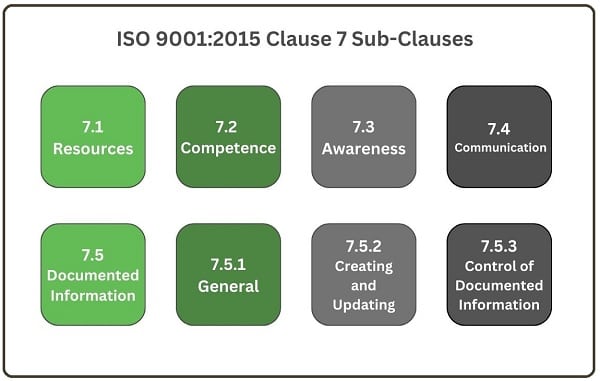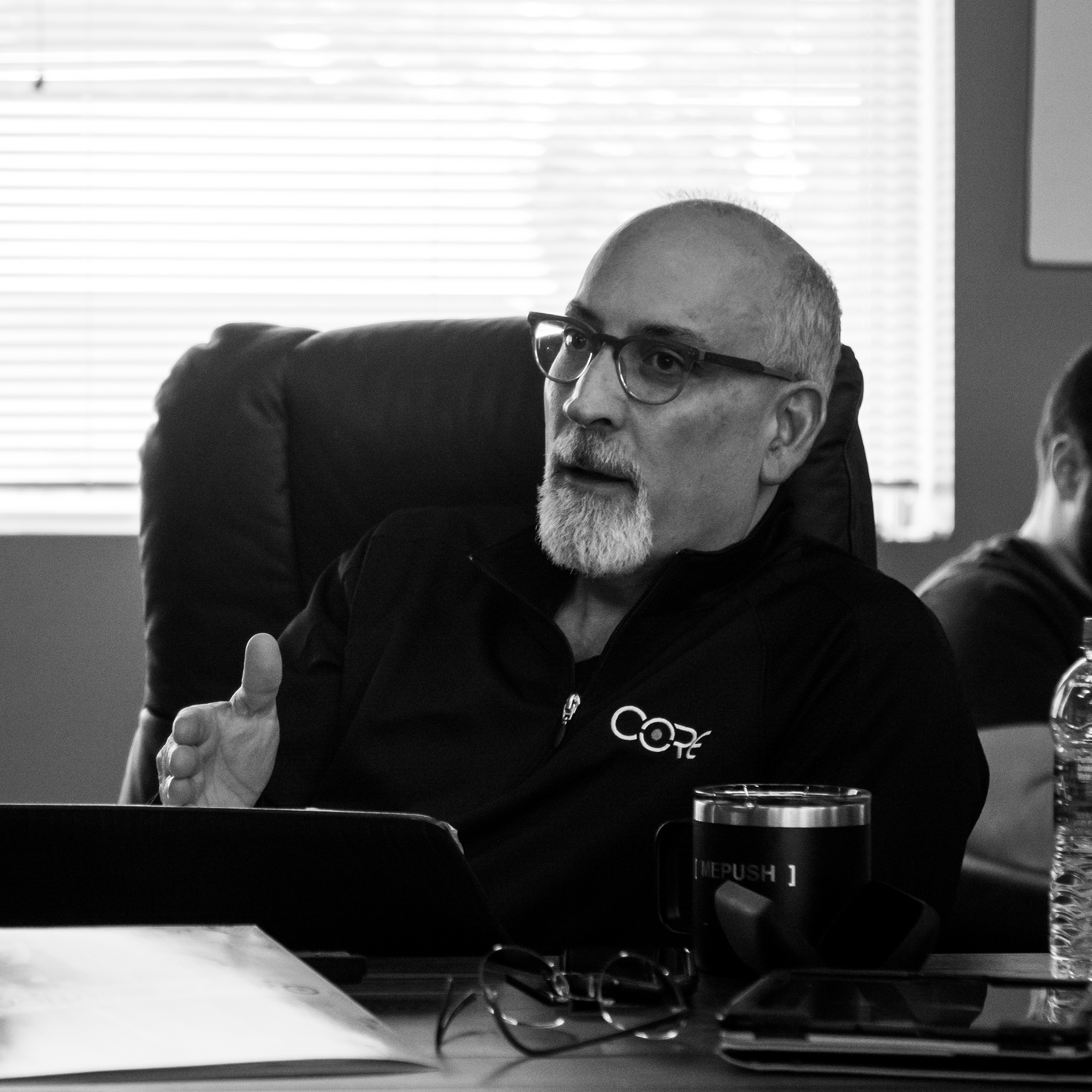ISO 9001:2015 Clause 7
What is the ISO 9001:2015 Clause 7?
Clause 7 of the ISO 9001:2015 standard, titled “Support,” establishes the necessary support mechanisms and resources for the effective implementation and maintenance of a quality management system (QMS). The overall purpose of this clause is to ensure that organizations have the necessary support structures in place to enable the achievement of quality objectives and the successful operation of the QMS.
Clause 7, Support, highlights the importance of creating an environment where employees have the necessary resources and knowledge to contribute effectively to the QMS. It ensures that support structures are in place to enable the successful implementation and maintenance of the QMS, fostering a culture of quality and continuous improvement within the organization.
The Specific Objectives of Clause 7, Support, are as follows:
1. Resources:
Organizations are required to determine and provide the necessary resources to support the operation and continual improvement of the QMS. This includes providing competent personnel, infrastructure, equipment, and financial resources to meet customer requirements and enhance product and service quality.
Get a Free Quote
2. Competence:
The clause emphasizes the importance of ensuring that personnel who perform work affecting product or service quality are competent. Organizations must determine the necessary competence levels, provide appropriate training and development opportunities, and evaluate the effectiveness of training programs.
3. Awareness and Communication:
Organizations must ensure that employees are aware of the importance of their activities and how they contribute to the achievement of quality objectives. This includes providing information and communication channels to foster a quality culture and enable effective QMS implementation.
4. Documented Information:
The clause emphasizes the need for organizations to establish and maintain documented information to support the operation of the QMS. This includes procedures, work instructions, forms, and records that ar necessary for effective planning, operation, and control of processes.
5. Control of Documents:
Organizations must establish a process for controlling documented information creation, approval, and distribution. This ensures that the latest and correct versions of documents are available, preventing the use of obsolete or invalid information.
6. Control of Records:
The clause requires organizations to establish a process for identifying, collecting, indexing, storing, and retrieving records that demonstrate conformity to requirements and the effective operation of the QMS. This includes defining retention periods for records and ensuring their protection from loss, damage, or unauthorized access.
By addressing the objectives of Clause 7, organizations establish a solid foundation for the support of their QMS. The provision of resources, competent personnel, effective communication channels, and accurate documented information enables the smooth operation of the QMS and supports the organization’s ability to meet customer requirements and enhance product and service quality.

Complying with Clause 7
Complying with Clause 7, titled “Support,” in the ISO 9001 Standard involves establishing and maintaining the necessary support systems and resources to enable the effective implementation and operation of the quality management system (QMS).
Here are some examples of how an organization can comply with Clause 7:
1. Competence and training:
Ensure that personnel involved in QMS-related activities possess the necessary competence and qualifications. Define competency requirements, provide appropriate training, and maintain records of employee training and development.
2. Infrastructure and work environment:
Identify and provide the infrastructure, facilities, and work environment necessary for the effective operation of the QMS. This includes ensuring appropriate workspace, equipment, technology, utilities, and environmental conditions.
3. Awareness and communication:
Raise awareness among employees about the QMS, its importance, and their individual roles and responsibilities. Establish effective communication channels to ensure the flow of information related to quality requirements, objectives, and performance throughout the organization.
4. Documented information control:
Establish a document control system to manage the creation, review, approval, distribution, and control of documented information, including policies, procedures, work instructions, and records. Ensure that documents are properly controlled, accessible, and up-to-date.
5. Resource allocation:
Allocate resources, including human resources, infrastructure, technology, and financial resources, to support the implementation and maintenance of the QMS. Ensure that resources are available to meet the organization’s quality objectives and support the QMS processes.
6. Supplier management:
Implement a process for evaluating and selecting suppliers based on their ability to meet quality requirements. Establish criteria for supplier evaluation, performance monitoring, and feedback mechanisms to ensure the quality of purchased products and services.
7. Risk management:
Incorporate risk management practices into the QMS to identify and address risks that may impact the achievement of quality objectives. Develop strategies to mitigate risks and prevent or minimize potential negative impacts on quality performance.
8. Document control:
Establish procedures for controlling and managing documented information, including version control, review cycles, and access restrictions. Ensure that documented information is readily available, legible, and protected against loss or damage.
9. Nonconformity and corrective action:
Establish processes for identifying, documenting, and addressing nonconformities and taking appropriate corrective actions. Implement root cause analysis methodologies to identify the underlying causes of nonconformities and implement preventive actions to avoid recurrence.
10. Continual improvement:
Foster a culture of continual improvement by encouraging employees to provide suggestions for process enhancements, participate in improvement initiatives, and contribute to problem-solving efforts. Regularly review performance data, customer feedback, and process metrics to identify areas for improvement.
Compliance with Clause 7 ensures that the organization has the necessary support systems in place to enable the effective implementation and operation of the QMS. By addressing competence, infrastructure, communication, documentation control, resource allocation, supplier management, risk management, and continual improvement, organizations can enhance the overall performance of the QMS and drive customer satisfaction.
A History of the ISO 9001 Standard Clause 7
Clause 7 of the ISO 9001 standard, titled “Support,” has undergone changes and refinements throughout the history of the standard. Let’s explore the evolution of Clause 7 over the different versions of ISO 9001:
ISO 9001:1987:
The initial version of ISO 9001, published in 1987, did not have a dedicated clause for “Support.” The standard primarily focused on quality assurance and control processes, without explicitly addressing the support functions within a quality management system (QMS).
ISO 9001:1994:
In the 1994 revision, ISO 9001 introduced the concept of a “Quality Manual” and “Quality System” in Clause 4. While it addressed some elements related to support functions, there was no dedicated clause specifically addressing support activities within the QMS.
ISO 9001:2000:
The year 2000 brought significant changes to ISO 9001, including the introduction of the High-Level Structure (HLS) developed by ISO. Clause 6, titled “Management Responsibility,” included requirements for resources, infrastructure, and work environment. However, there was no dedicated clause solely focused on support.
ISO 9001:2008:
The 2008 revision introduced Clause 6.3, titled “Infrastructure,” which encompassed some support-related requirements. However, it was not a comprehensive standalone clause dedicated to support functions.
ISO 9001:2015:
The 2015 revision of ISO 9001 introduced a dedicated clause, Clause 7, titled “Support.” This marked a significant development in the standard, highlighting the importance of support functions within the QMS. The revised clause includes requirements related to resources, competence, awareness, communication, documented information, and control of documented information.
ISO 9001:2015 introduced specific sub-clauses under Clause 7, including:
7.1 Resources
7.2 Competence
7.3 Awareness
7.4 Communication
7.5 Documented information
7.5.1 General
7.5.2 Creating and updating
7.5.3 Control of Documented Information
The current version of ISO 9001, ISO 9001:2015, places significant emphasis on the support functions required to establish and maintain an effective QMS. It requires organizations to provide the necessary resources, ensure competent personnel, foster awareness of quality requirements, establish effective communication channels, and manage documented information.
By incorporating support requirements, ISO 9001:2015 ensures that organizations have the necessary infrastructure, resources, and competence to deliver products and services that meet customer requirements. The inclusion of documented information requirements emphasizes the importance of maintaining accurate, up-to-date, and controlled documentation within the QMS.
Overall, Clause 7, Support, in ISO 9001:2015 recognizes the critical role that support functions play in enabling the effective operation of the QMS. It ensures that organizations have the necessary support systems, resources, and information management processes in place to drive quality, efficiency, and continual improvement.
Consulting Support for ISO 9001
Every year, we help hundreds of small businesses achieve ISO 9001 certification. Support for ISO 9001 is available through any of our Consulting Programs
As an American business with a story like yours, we know that time is valuable. Our expert consultants are here to take on the difficult, technical aspects of certification so you can focus on your business. They’ll work with you every step of the way until you’re successfully certified.
Interested? Get a Free Quote.
In many industries, ISO 9001 has become a supply-chain requirement. When landing a big contract, ISO 9001 certification could make all the difference.
About Scott Dawson
Since 2010, Scott Dawson, President of Core Business Solutions, has been an active voting member of the U.S. Technical Advisory Group (TAG) to ISO Technical Committee 176 (TC 176). TAG 176 members meet to discuss and develop U.S. positions for Quality Management standards, including ISO 9001:2015, which will be revised in 2026.


About Core Business Solutions
"Core Business Solutions was started by my brother, Mike Dawson, and myself, true entrepreneurs at heart looking for a better way to make a living and help small businesses improve the quality of the products and services they provide.
The bottom line: we are real people that have developed a team to come along side you to help you grow and succeed."
-- Scott Dawson, President
Related Standards
We provide consulting support for various other standards, as well as support for companies seeking multiple certifications through an Integrated Management System.
AS9100
Aerospace Manufacturers
AS9120
Aerospace Distributors
ISO 14001
Environmental Management Systems
ISO 27001
Information Security Management Systems
ISO 20000-1
Service Management Systems
ISO 45001
OH&S Management Systems
ISO 13485
Medical Device Manufacturers
AS9100
AS9120
ISO 14001
ISO
20000-1
ISO 27001
ISO 45001
ISO 13485
Equip Your Business to Meet ISO 9001 With CORE
At Core Business Solutions, we’re here to equip your company to meet ISO 9001 requirements successfully. We’ve helped hundreds of small businesses grow and deliver the best solutions to their clients. We provide ISO training services, consulting help, and compliance software to help you get certified and stay certified. We focus on optimizing your processes and helping you implement an ISO-compliant QMS. When you partner with us, you’ll get the tools and help you need for success.
For more information on the ISO 9001:2015 standard, please visit our articles page. You can also call our consulting office at 866-354-0300.
Do you want to update your existing ISO 9001 QMS System or refresh it?
We provide consulting services to assist you in your ISO 9001 Quality Management System refresh. We listen, conduct a gap analysis, update your Quality Policy and any necessary documentation or procedures, find areas of waste or improvement, simplify and automate. And we do it fast. Core offers firm, fixed pricing. Download our information sheet today to learn more or call us at 866-354-0300 Extension 2.
